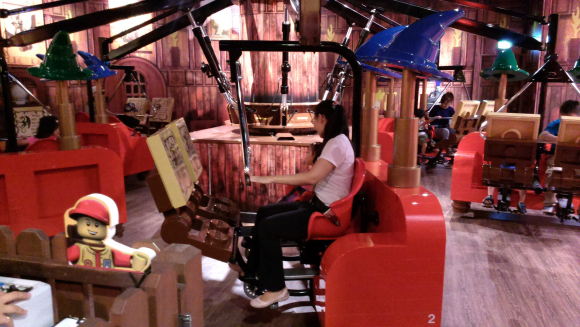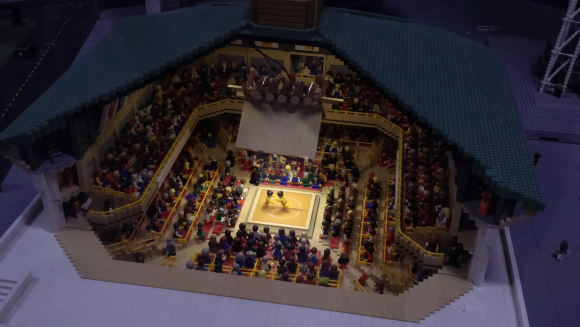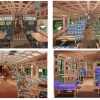
Tokyo Legoland Discovery Center bricked themselves into an uncomfortable corner when it comes to disability rights, and has issued a formal apology.
With eight flagship parks worldwide, Legoland is one of the top pit stops on any budding architect’s childhood wish list. Japan sports its own main Legoland in Nagoya, but there are also indoor editions of the park: “Discovery Centers”, which you can visit in Tokyo or Osaka. The park is studded with architectural attractions: there’s multiple rides, visitors can design, build and race their own Lego cars, and even leap and bound through ninja-tastic Lego backdrops.
▼ Get right up close to miniature recreations of sumo wrestlers!
For Niigata-based teacher Tsuyoshi Abe, who is deaf, it was the perfect place to take his son and daughter for a day out. However, he reached an unexpected blockade when he, his two children and a family friend tried to enter the park on April 21 of this year. The employee staffing the entrance called the four of them back, demanding to know if any of them could hear. Mr. Abe was then informed in writing that theme park policy requires any disabled guests to have at least one accompanying, able-bodied support guest. As all four of Mr. Abe’s party couldn’t hear, the staff explained, they were unable to grant them access to the park.
According to the policy written on Legoland Discovery Center Tokyo’s website, the reason they don’t permit entry is because without an accompanying guest and all-deaf party wouldn’t be able to hear the disaster alarms and so the park would not be able to guarantee their safety.
While this would be upsetting enough for anyone in this situation (the man’s children reportedly asked why all the other children could play inside when they couldn’t) Mr. Abe was very qualified to tackle this injustice directly. As a teacher for the deaf, and a representative for children’s support groups at his school, he took it upon himself to reach out to the Japanese Federation of the Deaf, who took the issue straight to the government.
500RT:【運営会社は謝罪】レゴランド東京、聴覚障害者の入館を断るhttps://t.co/yZPtujB7Vx
— ライブドアニュース (@livedoornews) June 22, 2018
スタッフは入館を断った際に「災害時に避難の呼びかけに応じることができないため」と理由を説明していたという。 pic.twitter.com/oxUYqvhVkw
Thankfully this story has a happy ending: the courts found that refusing a disabled customer access to a store, park or service without a helper violates the Act for Eliminating Discrimination Against People with Disabilities. June 13 saw the Ministry of Economy, Trade and Industry formally request the company to “work hard to better understand the law and implement changes accordingly”. A formal apology from Merlin Japan Entertainment representative Peter Lee followed, so hopefully from here on out parents and children will be able to attend the park without any issues.
This issue has become a hot topic on the net, with users wondering “why couldn’t a member of staff just accompany the family?” and pointing out “surely you don’t need to be able to hear to notice a disaster: if everyone around you is running, then you run too – it’s not like the park is even that big.” Many users noted that as the party were able to come to the park in the first place, there should have been no problem with them navigating the park alone.
Of course, as with any controversial topic there were people arguing the opposite as well: “Why should the company have to apologize just for guaranteeing people’s safety? This is just a modern day witch hunt.” Multiple users considered the issue of responsibility – “if something bad were to be happen, would the family take responsibility or would they push blame onto the people who permitted them, I wonder?”
Considering the rough and rocky start to business the main Legoland park has endured, you would think that the park would be eager to get as many guests through the doors as possible.
Source: JIN, Asahi Shimbun, Legoland Japan
Featured image: Flickr/Tzuhsun Hsu
Insert image: Flickr/Tzusun Hsu


 Japan is getting its first full-scale Legoland amusement park
Japan is getting its first full-scale Legoland amusement park Ninjago World to arrive in Legoland Japan, lets visitors learn the blocky ways of the shadow
Ninjago World to arrive in Legoland Japan, lets visitors learn the blocky ways of the shadow Legoland Japan celebrates first anniversary with world’s largest LEGO cherry blossom tree【Video】
Legoland Japan celebrates first anniversary with world’s largest LEGO cherry blossom tree【Video】 One Piece ship to anchor at Japanese theme park
One Piece ship to anchor at Japanese theme park Eraser stamp of Tokyo Disneyland is almost as amazing as the theme park
Eraser stamp of Tokyo Disneyland is almost as amazing as the theme park Red light district sushi restaurant in Tokyo shows us just how wrong we were about it
Red light district sushi restaurant in Tokyo shows us just how wrong we were about it Pokémon Sleep camping suite and guestrooms coming to Tokyo Hyatt along with giant Snorlax burgers
Pokémon Sleep camping suite and guestrooms coming to Tokyo Hyatt along with giant Snorlax burgers Sandwiches fit for a sumo served up in Osaka【Taste Test】
Sandwiches fit for a sumo served up in Osaka【Taste Test】 McDonald’s new Happy Meals offer up cute and practical Sanrio lifestyle goods
McDonald’s new Happy Meals offer up cute and practical Sanrio lifestyle goods Tokyo Tsukiji fish market site to be redeveloped with 50,000-seat stadium, hotel, shopping center
Tokyo Tsukiji fish market site to be redeveloped with 50,000-seat stadium, hotel, shopping center Akihabara pop-up shop sells goods made by Japanese prison inmates
Akihabara pop-up shop sells goods made by Japanese prison inmates Starbucks Japan adds a Motto Frappuccino to the menu for a limited time
Starbucks Japan adds a Motto Frappuccino to the menu for a limited time Japanese ramen restaurants under pressure from new yen banknotes
Japanese ramen restaurants under pressure from new yen banknotes Beautiful Red and Blue Star luxury trains set to be Japan’s new Hokkaido travel stars
Beautiful Red and Blue Star luxury trains set to be Japan’s new Hokkaido travel stars Anime girl English teacher Ellen-sensei becomes VTuber/VVTUber and NFT
Anime girl English teacher Ellen-sensei becomes VTuber/VVTUber and NFT All-you-can-drink Starbucks and amazing views part of Tokyo’s new 170 meter-high sky lounge
All-you-can-drink Starbucks and amazing views part of Tokyo’s new 170 meter-high sky lounge More foreign tourists than ever before in history visited Japan last month
More foreign tourists than ever before in history visited Japan last month French Fries Bread in Tokyo’s Shibuya becomes a hit on social media
French Fries Bread in Tokyo’s Shibuya becomes a hit on social media Studio Ghibli releases new action figures featuring Nausicaä of the Valley of the Wind characters
Studio Ghibli releases new action figures featuring Nausicaä of the Valley of the Wind characters New private rooms on Tokaido Shinkansen change the way we travel from Tokyo to Kyoto
New private rooms on Tokaido Shinkansen change the way we travel from Tokyo to Kyoto Starbucks reopens at Shibuya Scramble Crossing with new look and design concept
Starbucks reopens at Shibuya Scramble Crossing with new look and design concept Studio Ghibli glasses cases let anime characters keep an eye on your spectacles
Studio Ghibli glasses cases let anime characters keep an eye on your spectacles Beautiful Ghibli sealing wax kits let you create accessories and elegant letter decorations【Pics】
Beautiful Ghibli sealing wax kits let you create accessories and elegant letter decorations【Pics】 Studio Ghibli releases Kiki’s Delivery Service chocolate cake pouches in Japan
Studio Ghibli releases Kiki’s Delivery Service chocolate cake pouches in Japan New definition of “Japanese whiskey” goes into effect to prevent fakes from fooling overseas buyers
New definition of “Japanese whiskey” goes into effect to prevent fakes from fooling overseas buyers Our Japanese reporter visits Costco in the U.S., finds super American and very Japanese things
Our Japanese reporter visits Costco in the U.S., finds super American and very Japanese things Studio Ghibli unveils Mother’s Day gift set that captures the love in My Neighbour Totoro
Studio Ghibli unveils Mother’s Day gift set that captures the love in My Neighbour Totoro New Japanese KitKat flavour stars Sanrio characters, including Hello Kitty
New Japanese KitKat flavour stars Sanrio characters, including Hello Kitty New Pokémon cakes let you eat your way through Pikachu and all the Eevee evolutions
New Pokémon cakes let you eat your way through Pikachu and all the Eevee evolutions Disney princesses get official manga makeovers for Manga Princess Cafe opening in Tokyo
Disney princesses get official manga makeovers for Manga Princess Cafe opening in Tokyo Sales of Japan’s most convenient train ticket/shopping payment cards suspended indefinitely
Sales of Japan’s most convenient train ticket/shopping payment cards suspended indefinitely Sold-out Studio Ghibli desktop humidifiers are back so Totoro can help you through the dry season
Sold-out Studio Ghibli desktop humidifiers are back so Totoro can help you through the dry season Japanese government to make first change to romanization spelling rules since the 1950s
Japanese government to make first change to romanization spelling rules since the 1950s Ghibli founders Toshio Suzuki and Hayao Miyazaki contribute to Japanese whisky Totoro label design
Ghibli founders Toshio Suzuki and Hayao Miyazaki contribute to Japanese whisky Totoro label design Doraemon found buried at sea as scene from 1993 anime becomes real life【Photos】
Doraemon found buried at sea as scene from 1993 anime becomes real life【Photos】 Tokyo’s most famous Starbucks is closed
Tokyo’s most famous Starbucks is closed One Piece characters’ nationalities revealed, but fans have mixed opinions
One Piece characters’ nationalities revealed, but fans have mixed opinions We asked a Uniqlo employee what four things we should buy and their suggestions didn’t disappoint
We asked a Uniqlo employee what four things we should buy and their suggestions didn’t disappoint Princesses, fruits, and blacksmiths: Study reveals the 30 most unusual family names in Japan
Princesses, fruits, and blacksmiths: Study reveals the 30 most unusual family names in Japan The Great Obon Disaster: A fable of cicadas, dancing, and cats
The Great Obon Disaster: A fable of cicadas, dancing, and cats Tokyo Disney Resort plans 300-billion yen expansion, rumored to be third Tokyo Disney theme park
Tokyo Disney Resort plans 300-billion yen expansion, rumored to be third Tokyo Disney theme park World’s largest retail LEGO store to open just outside of Shanghai Disneyland Park in June
World’s largest retail LEGO store to open just outside of Shanghai Disneyland Park in June Victim of 3.11 to people who have never suffered a disaster: Don’t send origami cranes to shelters
Victim of 3.11 to people who have never suffered a disaster: Don’t send origami cranes to shelters South Korean ferry disaster: Rescue ship was fitted with salmon-fishing sonar
South Korean ferry disaster: Rescue ship was fitted with salmon-fishing sonar Japanese office disaster: man pees in drink bottle of woman coworker because “he liked her”
Japanese office disaster: man pees in drink bottle of woman coworker because “he liked her” Stay dry with Japan’s top 10 indoor attractions for rainy days, as voted by tourists
Stay dry with Japan’s top 10 indoor attractions for rainy days, as voted by tourists Two human beings set to marry Sanrio characters at Tokyo’s Hello Kitty theme park
Two human beings set to marry Sanrio characters at Tokyo’s Hello Kitty theme park “No dogs allowed”: Why one service dog was refused entrance to these restaurants in Japan
“No dogs allowed”: Why one service dog was refused entrance to these restaurants in Japan Japanese gang of elementary-school-age bamboo thieves let off the hook for heartwarming reason
Japanese gang of elementary-school-age bamboo thieves let off the hook for heartwarming reason Mystery of Attack on Titan’s Levi’s lipstick-stained romantic dalliance at Japanese theme park
Mystery of Attack on Titan’s Levi’s lipstick-stained romantic dalliance at Japanese theme park Giant Buddhist pagoda and Kannon statue in Fukuoka Prefecture look like a theme park
Giant Buddhist pagoda and Kannon statue in Fukuoka Prefecture look like a theme park Foreign travelers in Tokyo, other towns handing out flags, asking Japanese people to pay for them
Foreign travelers in Tokyo, other towns handing out flags, asking Japanese people to pay for them Dead body found in car in parking lot in Japan, police say it may have been there over two years
Dead body found in car in parking lot in Japan, police say it may have been there over two years “No ball games” & “No practicing comedy routines”: City Parks in Japan let you do less and less
“No ball games” & “No practicing comedy routines”: City Parks in Japan let you do less and less Three-day search for two-meter-long python in Okayama ends, found in owner’s car dashboard
Three-day search for two-meter-long python in Okayama ends, found in owner’s car dashboard
Leave a Reply